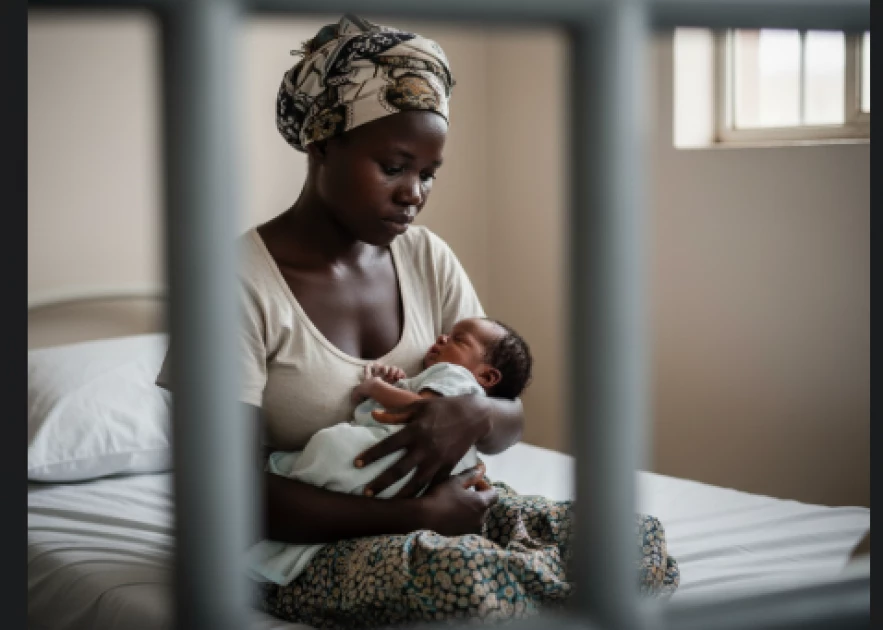Detain no mother, detain no child: Poverty is not a crime

An AI-generated image depicts a mother and child detained in hospital.

Audio By Vocalize
Childbirth is a sacred moment, a vulnerable yet beautiful experience that reflects the fragility and resilience of life. Yet in our country, this moment too often turns into trauma.
Instead of leaving maternity wards with their babies and dignity, some mothers are detained, treated like criminals simply because they cannot pay hospital bills.
This practice is not only inhumane; it is unconstitutional, illegal, and morally indefensible.
Hospitals often argue that they have bills to pay and that detaining mothers is the only way to compel families to settle accounts. But we must be honest, no financial justification can excuse holding a mother who has just endured the pain of childbirth or separating a newborn from their family, simply because of poverty.
Article 43 of the Constitution of Kenya guarantees every person the right to the highest attainable standard of health, including reproductive health care. Article 53 further upholds every child’s right to parental care and protection. The detention of mothers and their babies directly violates these constitutional guarantees.
In addition, international conventions ratified by Kenya – including the Universal Declaration of Human Rights and the Convention on the Rights of the Child – explicitly condemn such practices as degrading and unlawful.
Legally, detention for debt is prohibited. The Kenyan High Court has repeatedly affirmed that no hospital has the authority to hold patients for the inability to pay. Yet the practice persists, quietly and unchecked.
Mothers, often powerless to fight back, do not challenge the system. The law could not be clearer: health facilities must seek payment through lawful civil processes, never through the unlawful detention of women and their newborns.
But beyond the law, we must face human reality. Imagine a mother – let us call her Chepkemoi. She arrives at the hospital in labor, bleeding, and fearful.
She delivers a healthy baby, but complications follow. A few days later, she is handed a bill of Ksh.15,000.
As a market vendor who barely earns Ksh.200 a day, she cannot afford to pay. Instead of being discharged, she is detained in the ward. Her husband sells a goat, but it is not enough.
Days turn into weeks. Chepkemoi endures humiliation as her dignity is stripped away. What should have been a place of healing becomes a prison. Her newborn now lies beside her in captivity.
What message do we send to society when motherhood is punished with detention, when the very act of giving life becomes a sentence to a debtor’s prison? We undermine trust in our health systems and entrench cycles of poverty.
There are humane and practical solutions that uphold dignity while addressing the financial realities of healthcare.
Government programs, such as Linda Jamii and the Social Health Authority (SHA), should be expanded and adequately funded so that no mother falls through the cracks.
Maternity must be free, not just in rhetoric, but in practice. Hospitals can recover costs through structured payment plans or even by using small claims courts without resorting to degrading and unlawful practices.
The private sector, philanthropists and non-profit organizations can establish emergency maternal support funds to cushion the most vulnerable.
At the community level, cooperative savings groups and local health financing initiatives can help families prepare for emergencies without falling into catastrophic debt.
The issue is not whether hospitals need money – they do. The issue is the means. Detaining mothers and babies are not policy; it is cruelty disguised as necessity. And the emotional toll far outweighs the unpaid bill.
Children spend their first days of life in confinement. Mothers, already traumatized by labor, are consumed with shame and despair. Families face impossible choices – selling their last possessions or seeing their loved ones detained.
These are not mere statistics – they are human lives, fragile and deserving of dignity.
Our society must choose: do we value profit over dignity, or do we uphold the sanctity of motherhood? No mother chooses poverty and no child chooses the circumstances of their birth.
To detain them is to punish them for their vulnerability. We must demand legislative enforcement, hospital accountability and stronger government oversight.
We must raise our collective voice and declare: childbirth should never be criminalized. Every detained mother is a silent indictment of our shared humanity.
Let us choose compassion over cruelty, law over illegality and dignity over detention – because when a mother brings life into this world, the least we owe her is to protect her own.
The writer, Lawrence Omondi, is the Founder & Executive Director Machozi Ya Mwisho Initiative


Leave a Comment